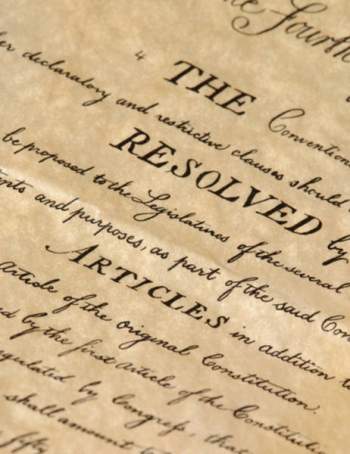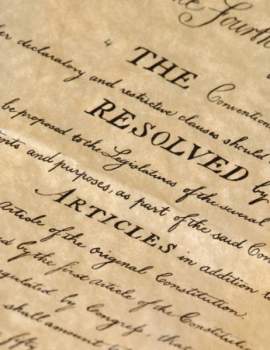
Understanding the 9th Amendment

Popular In Constitution
Purpose Of Lifetime Appointment And Pros And Cons Enumerated Powers Bicameral Legislature Background Article 3 Of The Constitution We The People 1st Amendment Who Wrote The Constitution Judicial Review Equal Protection Clause 5th Amendment 10th Amendment Three Fifths Compromise
The inclusion of the Bill of Rights into the United States Constitution was met with some controversy and opposition. Even though the Bill of Rights is heralded as some of the most important legislation that the United States Constitution has to offer, as the document was being ratified by the states, arguments arose opposing its inclusion.
The Federalists held that the inclusion of a Bill of Rights could prove to lead to problems regarding the interpretation of those laws included within, and more importantly, those not. The main argument posed by Federalists such as Alexander Hamilton and James Madison was that enumerating certain laws into legislation could be implying that those not strictly included or discussed within the text of the legislation are not to be considered as rights or laws. The Federalists also contended that it would be an exercise in futility to account for and list all of the fundamental rights of the people in one document. For the sense of clarity and concise presentation of laws, a Bill of Rights would seem to be pointless. In enumerating certain rights, but not others, the Federalists also feared that this would leave the Government to have more authority in interpreting those rights not listed, and possibly leave the door open for the Government to infringe on certain basic and fundamental human rights.
The 9th Amendment arose out of the disputes over the inclusion of a Bill of Rights and its effect on the ratification of the United States Constitution by certain states. The inclusion of the 9th Amendment was to address the issue that even though certain rights were not enumerated or explicitly included within the provisions of the first eight Amendments, they are protected by virtue and fall within and are protected by the provisions of those included in the United States Constitution.
The 9th Amendment states, "The enumeration in the Constitution, of certain rights, shall not be construed to deny or disparage others retained by the people." In other words, simply because there are rights not included in the text, that does not deny their existence nor does it give the Government control over those implied rights, and more specifically, does not give the authority to infringe upon those fundamental rights.
In more recent applications, the 9th Amendment has been viewed as evidence that certain rights exist that are granted to the people even though they are not explicitly enumerated by the United States Constitution, but are still protected under other provisions and included by virtue of the other Amendments.
The most notorious case regarding the 9th Amendment is Griswold v. Connecticut, in which a State law prohibiting the use of contraceptives was challenged as infringing on the right of marital privacy. Even though the concept of marital privacy is not included within the text of the United States Constitution, it is, by virtue, one of those natural and inherent rights that must be protected. Therefore, it was decided that martial privacy, though not found in the first eight Amendments, is still protected by the First Amendment, as well as the Third, Fourth, and Fifth Amendments through association.
The 9th Amendment and its inclusion into the Bill of Rights is crucial for the proper interpretation of its provisions, while also securing protection of those rights inherently granted to the people as natural by virtue.


















